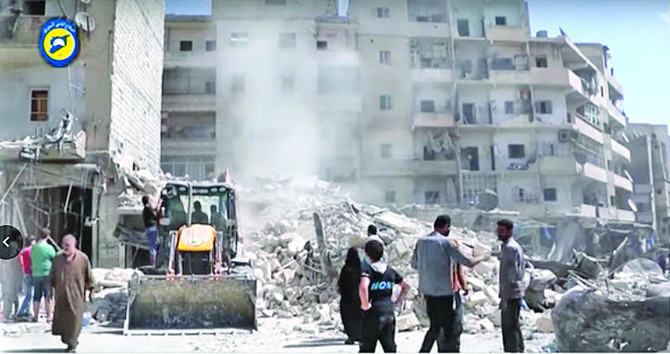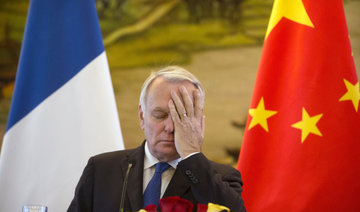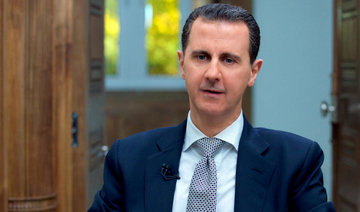BEIRUT: In his comments of the latest chemical bombardment in northern Syria, Russian President Vladimir Putin mocked what he descried as the “Western account” of what happened in Khan Sheikhun.
Referring to confirmations that civilians were targeted with chemical bombs by the regime of President Bashar Assad, the Russian president described this as no more than a “play.”
Putin’s statements are the latest propaganda pumped out by Russian media and allied media sources.
Beginning with the Russian military intervention in Syria in 2015, such propaganda and the Russian narrative has focused on the idea that all massacres are carried out by the “extremist” opposition, with no links made to the Syrian regime or Russian forces.
This propaganda reached an all-time high with the Khan Sheikhun massacre, both in terms of quantity and scope.
There is no mention of the testimonies of survivors, nor reports about Abdul Hamid Youssef, the Syrian father who lost his twin babies and 20 members of his family. There is also no mention of the documented history of massacres, bombings, and chemical attacks mentioned in international reports, the most recent of which was issued last month by Human Rights Watch.
There is only one story being amplified. Since 4 April, the day of the Khan Sheikhun attack that killed at least 87 civilians, including 31 children, Russian media, particularly Russia Today and Sputnik, have broadcast content almost daily that questions the root of the massacre or attributes the killing to the armed opposition.
For example, Russia Today posted reports attributed to Russian military analysts claiming that images of the town do not contain evidence of the use of live bombs containing chemical materials. It also carried an analytical piece about the timing of the bombing, and why such a bombing does not benefit Bashar Assad.
Of course, there was no mention about the identity of the “experts” cited, nor the evidence upon which they based their views.
Similarly, Sputnik broadcasted a report on one channel that claimed that the bases of the Syrian regime targeted by US missile strikes do not contain chemical materials. Again, there was no mention of evidence or documented analyzes; rather, just more pumping out of fake news.
The peak of news fabrication came in a broadcast by Sputnik, which claimed that the children who died in the Khan Sheikhun massacre were not killed by chemical weapons launched by the Syrian regime, but rather were killed by the civil defense volunteers known as the White Helmets.
The news was based on reports falsely attributed to Swedish doctors alleged to have said, according to a Russian site, that they “uncovered the deceit of the White Helmets.”
To trace back to the root of the story, Sputnik had published news on behalf of Veterans Today that was supposedly a translation of a report by the Swedish doctors.
Russian media, through Sputnik and Russia Today, spread the fake news extensively across all social media outlets and other media sources loyal to the Syrian regime, from Al-Alam to Al-Manar to Al-Maydan and other websites. All described the chemical massacre as an “act” produced by the White Helmets who, according to the Russian narrative, “did not rescue Syrian children but instead killed them in order to produce media images and videos that look more realistic.”
This series of fake reporting began with a lie that was circulated and republished to the extent that the original news got lost. Much of this propaganda in fact stems from one source, as it became evident that even sites that translated the news, such as the English site South Front are registered in Moscow.
The irony is that this fake news that has continued to spread, even after the Swedish organization attributed and linked to the report refuted it. In a published statement confirming that it analyzed some videos published the White Helmets, Swedish Doctors for Human Rights did not accuse them of killing children. In response to Russian allegations, it said “this rhetoric is inaccurate and does not represent our position on the mentioned case.”
Yet Russian media have insisted on exaggerating and distorting the false claims, rebroadcasting them in different formats on different sites loyal to Russian policy. All these outlets have continued to broadcast the build on the inaccurate version of the news, even after the organization issued its clarification.
Usually, a statement as clear as the one published by the Swedish organization and made available on its official website would end any debate around the issue. But this is not the case.
And this is an illustration of the extent to which Russian propaganda is based on spreading incorrect information, as it is quite easy to clarify or correct false news if there is the desire to.
However, the sites continue to publish the fake news, showing no interest in modifying the story. A Google search will show that the dissipation of this fake news is more than double that of real news attributed to the Swedish organization, but the statement of the organization only is evident and visible when visiting the official website or through some limited sites that broadcast the fake statement.
The White Helmets is one of the primary organizations that is being focused on and targeted by Russian and Syrian media, as well other media in a similar vein. This is because this organization, through its volunteers and videos that it broadcasts, has been able to reveal a lot of the crimes carried out by the Syrian regime and Russian air forces, thus making it the main target in the campaign attack.
When the documentary about the White Helmets won the Oscar several weeks ago, it was subject to criticism and doubt by the Russian and Syrian regimes and their media. Ultimately the stories of the organization’s volunteers allowed people around the world to feel the pain of the Syrian people and the heroism of these young volunteers in carrying out unimaginable rescue operations. Many of these volunteers paid the price with their lives, which is what makes the stories of the White Helmets among the most powerful of the Syrian War.
In reality, Russian media will not stop their attempts to label the White Helmets as propaganda for terrorism, which is the same rhetoric used by Bashar Assad in more than one interview and statement.
What is suspicious, however, is the faces that appear in these campaigns, such as that of Vanessa Beeley. She describes herself as an independent British journalist, but Google only displays her interviews with Russian or Syrian media.
According to Beeley, these White Helmets cannot be considered an independent organization because they represent the interests of Western countries that support Syrian opposition organizations. She claims it is strange that members of the White Helmets are always present in areas under the control of terrorists and organizations like Daesh or Al-Nusra Front, or loyal organizations. Of course, she fails to mention the truth that the civil defense is barred from working in regime areas.
Her Facebook page is also filled with images of her in Syria and in areas under the control of the regime. But in these images, she appears as though she is on a tourism trip. There are a number of pictures of Bashar Assad, as well as writings about her trips which essentially summarize the Syrian regime as a secular regime fighting terrorism and Western colonialism.
These examples presented are in essence are an attempt to undermine the humanity of victims of the massacre. Victims are used as collateral in a long propaganda film supervised by “terrorists” and the West, which has been repeated and broadcasting with the blessing of the Syrian regime.
However, the rise of Russian propaganda since the Kremlin began its military work is what gives these lies a more dangerous dimension. The enormous potential and vast financial investments in Russian propaganda has allowed it to spread so widely, in turn allowing such media to lift Russia out from darkness and propel its own interests.
Propaganda, lies and videos: Russian media and the Khan Sheikhun massacre
Propaganda, lies and videos: Russian media and the Khan Sheikhun massacre

Grok faces more scrutiny over deepfakes as Irish regulator opens EU privacy investigation

- The regulator says Grok has created and shared sexualized images of real people, including children. Researchers say some examples appear to involve minors
- X also faces other probes in Europe over illegal content and user safety
LONDON: Elon Musk’s social media platform X faces a European Union privacy investigation after its Grok AI chatbot started spitting out nonconsensual deepfake images, Ireland’s data privacy regulator said Tuesday.
Ireland’s Data Protection Commission said it notified X on Monday that it was opening the inquiry under the 27-nation EU’s strict data privacy regulations, adding to the scrutiny X is facing in Europe and other parts of the world over Grok’s behavior.
Grok sparked a global backlash last month after it started granting requests from X users to undress people with its AI image generation and editing capabilities, including putting females in transparent bikinis or revealing clothing. Researchers said some images appeared to include children. The company later introduced some restrictions on Grok, though authorities in Europe weren’t satisfied.
The Irish watchdog said its investigation focuses on the apparent creation and posting on X of “potentially harmful” nonconsensual intimate or sexualized images containing or involving personal data from Europeans, including children.
X did not respond to a request for comment.
Grok was built by Musk’s artificial intelligence company xAI and is available through X, where its responses to user requests are publicly visible.
The watchdog said the investigation will seek to determine whether X complied with the EU data privacy rules known as GDPR, or the General Data Protection Regulation. Under the rules, the Irish regulator takes the lead on enforcing the bloc’s privacy rules because X’s European headquarters is in Dublin. Violations can result in hefty fines.
The regulator “has been engaging” with X since media reports started circulating weeks earlier about “the alleged ability of X users to prompt the @Grok account on X to generate sexualized images of real people, including children,” Deputy Commissioner Graham Doyle said in a press statement.
Spain’s government has ordered prosecutors to investigate X, Meta and TikTok for alleged crimes related to the creation and proliferation of AI-generated child sex abuse material on their platforms, Spanish Prime Minister Pedro Sánchez said on Tuesday.
“These platforms are attacking the mental health, dignity and rights of our sons and daughters,” Sánchez wrote on X.
Spain announced earlier this month that it was pursuing a ban on access to social media platforms for under-16s.
Earlier this month, French prosecutors raided X’s Paris offices and summoned Musk for questioning. Meanwhile, the data privacy and media regulators in Britain, which has left the EU, have opened their own investigations into X.
The platform is already facing a separate EU investigation from Brussels over whether it has been complying with the bloc’s digital rulebook for protecting social media users that requires platforms to curb the spread of illegal content such as child sexual abuse material.












